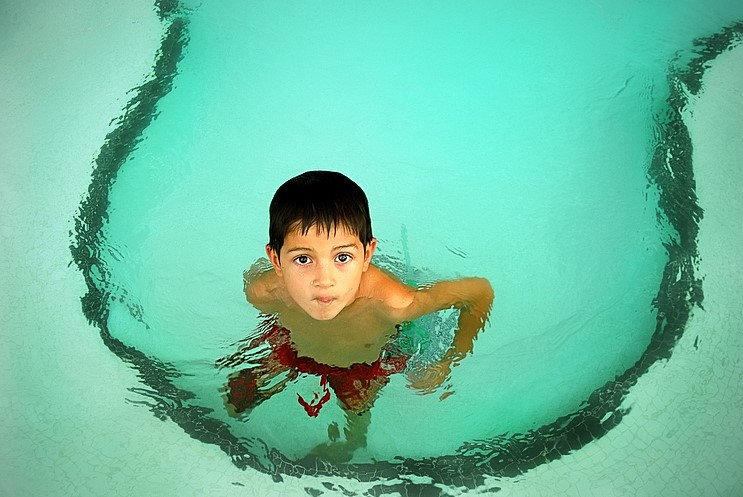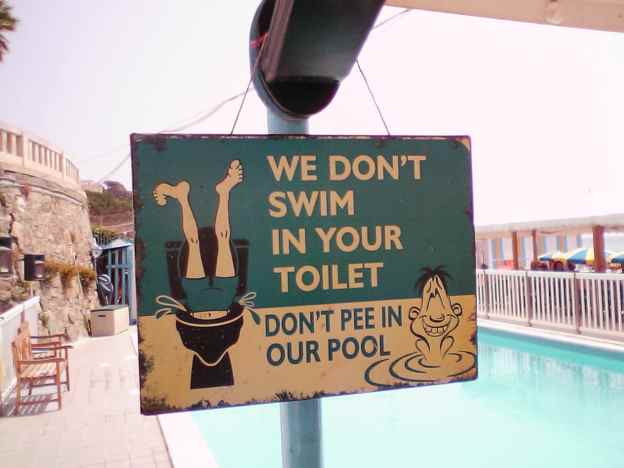Can You Tell If Someone Pees Inside the Pool?
If you want to know how to tell if someone peed in the pool, you have come to the right place.
Here, we will try to find out whether it is possible to know when someone urinates in your swimming pool.
Swimming pool urine detector dyes are a myth. They simply do not work. As we saw in the short post we did on what happens when you pee in the swimming pool.
So, is there really a way to tell if someone has peed in your swimming pool? Not really, just a number of assumptions.
If you are responsible for public swimming pool maintenance such as in a resort, it is “safer” to assume most of the people using the pool are peeing there, especially children.
Who peed in the pool?

Among all the swimming pool users, you might want to know who is more likely to pee in the water.
The answer is everyone!
Children
Kids will pee in the pool water all the time. If older than 3 years, kids will pee at least 12 times a day. If they take more fluids, they will pee many more times.
Therefore, when you have kids in the pool, assume they are peeing in the water. If anything, it feels so good, and most people just let it out involuntarily without thinking anything of it.
Some children could have a bladder that’s too small for their age, thus having to urinate more often. For such a child, urinating in the pool is not a big deal.
Seniors
Older people have their own urination patterns, with most of them seeing more urination frequency.
If they take water and/or other fluids before getting into the pool, they will need to pee more often.
Floating in water on your back or tummy can also do things to your bladder—you know, that buoyancy.
Women seniors are more likely to have bladder control problems, and holding their urine becomes harder. Weak pelvic muscles might also cause this.
If someone cannot hold their urine long enough to get to the bathroom, as soon as they feel the urge to pee, the urine just starts coming out.
Babies and toddlers

If you are taking the baby to the pool with you to train them how to swim (infants cannot swim instinctively on their own), they leak a lot. Toddlers will also pee in the pool, well, just because they can do it.
Unfortunately, unless you stop toddlers swallowing pool water, they will ingest the same contaminated water.
Even professional swimmers pee in the pool, sometimes
If someone is hydrating, drinking plenty of water and other fluids before they get into the pool, and they stay in the water for more than 60 minutes, I would assume they have peed in the pool.
Many people, even pros, do this so casually and think nothing of it at all!
Even when the swimming pool regulations say you should not pee inside, not all people heed this rule.
Just assume that many are peeing in the water.
Can urine be detected in a pool? Is there a chance?
In a small, inflatable swimming pool, it might be possible to detect urine by the smell, if many people pee in the water.
In a large, above ground swimming pool, it might be impossible to detect urine by the smell, well, because there is more water.
The only chance you have at detecting urine inside the pool is by testing for a common artificial sweetener that’s usually found in foods and drinks.
Acesulfame Potassium (ACE) is common in processed foods and drinks. Research has also shown that this sweetener is common in public swimming pools. It gets into the pool through urine.
But how often will you want to test your water for this sweetener? Unless you are doing research or something, you will not do it. Besides, even the test kit itself costs money.
This does not mean you should ignore this problem completely because it is a serious health issue. Therefore, if kids are using the pool, make sure that they have frequent bathroom breaks.
Does urine really turn pool water blue?

When someone pees in the swimming pool, there is absolutely no change in the watercolor.
Perhaps, if many people pee in a small swimming pool, it can change color to yellow or greenish. However, this is not going to happen in a large swimming pool.
The so-called urine indicator dye that is supposed to change the color of the water around a person who has peed does not exist.
So, if the water does not change color when someone pees, what then happens? Keep reading:
What happens to urine in a swimming pool?
Having urine in the swimming pool is a health hazard. It should be discouraged as much as possible.
When you shock pool water with chlorine, or just add the required amount for general maintenance, the chlorine stays around for days.
When someone pees in the pool, the pee contains nitrogen, which reacts with the chlorine to form a compound called Cyanogen chloride.
If Cyanogen chloride gets into the eyes, it causes irritation and tearing. Also, inhaling this compound in the water can cause asthma, but this would only happen with prolonged exposure.
For young kids who often swim, this gas can cause lung irritation.
Since research is ongoing, all the health effects of urine in the swimming pool may not be fully known. But from what is known, the health effects are serious.
If you are swimming with a yeast infection, you do not know what exposure to the urine-contaminated water can do to you.
Even without the health complications that can come from urine-contaminated water, it is just disgusting to think you could be swimming in that waste.
Remember, urine is not the only thing to worry about in the pool. There is fecal matter and microbes from the rectum. This is why it is very important to ensure that water does not get inside you when you swim.
Even with these downsides, swimming has many health benefits. You should not stop swimming. Just clean up as soon as you get out of a public pool.
Does urine turn pool water green?

Urine is not going to turn your pool water green, blue, red, or any other color, unless you have the whole world peeing in the pool.
So, what is the green color in the pool water? It comes from the presence of algae, an unbalanced pH, poor maintenance, a failed filtration system, and organic matter growing in the pool water.
In such a case, you just need to change the water, clean the pool thoroughly, and shock it. If there is organic matter in the pool, just remove it and then shock the water.
Neglecting pool maintenance is going to cause serious problems with the color of the water. It is vital that no one uses the swimming pool in that state.
The green color in the pool is also an indication of low chlorine. Since chlorine is added to the water to kill microbes and sterilize the water, if there is not enough of it, the microbes are roaming free.
Do pools have urine detection?

Swimming pools do have urine detection mechanisms, so you will have to keep up with the routine maintenance of the pool.
Ensure the chlorine levels are good. Caution your children from an early age about peeing inside the pool.
If you insist on it enough, they will desist from urinating inside the pool. Since urine lowers the level of free chlorine in the water, the level of bacteria will be high.
For home or commercial pools, there are simply no ways to detect urine unless one invests in test kits for the ACE artificial sweetener.
Since this is not viable for many people, the only way to swim safely is to maintain the right free chlorine levels in the pool. Cleaning the pool often during the swimming season can prevent contamination of the water.
At the end of the swimming season, winterize the swimming pool so that it does not collect a lot of dirt when it is not in use.
Final thoughts
It is not possible to tell whether someone peed in the pool just by looking at the water. There are also no urine-detection dyes.
Just assume there is urine in the water and swim all the same. When you swim in the ocean, the water is dirtier than that of a pool, but you swim all the same.
Maintain the pool as often as is recommended. Shock the pool if the water is filthy and has uncommon colors.
Just make sure you wear your swim trunks for men, and a swimming suit for women. If you feel really insecure about exposing your skin too much to the dirty water, perhaps you could cover up some more.
One of the ways to do that is to wear a wetsuit for swimming. It covers more of your body. Also, clean up under fresh water when you are done swimming.
